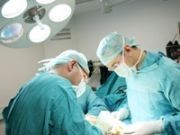Updates in Surgery: Percutaneous Coronary Intervention, Perioperative Biomarkers, and Troponin
During a follow-on session at the 2013 Southern Hospital Medicine Conference, Steven Cohn, MD, discussed the effect of PCI on subsequent non-cardiac surgery outcomes, monitoring specific hormone levels as indicators of cardiovascular risk, and other hot topics in perioperative medicine.

During his presentation “Perioperative Medicine II” at the 2013 Southern Hospital Medicine Conference in New Orleans, Steven Cohn, MD, internist at the University of Miami Miller School of Medicine, discussed perioperative biomarkers, percutaneous coronary intervention (PCI) and timing of subsequent noncardiac surgery.
In his discussion of biomarkers, Cohn talked about BNP (a prohormone) and NT-proBNP (an inactive cleavage product), both secreted by ventricular cardiomyocytes in response to stretching of the atrial/ventricular wall, which occurs in left ventricle dysfunction, myocardial ischemia, arrhythmias, and valvular abnormalities. Preoperative elevations of BNP/NT-proBNP are associated with adverse CV events in noncardiac and vascular surgery. Cohn said there is much that is not yet known about using either as biomarkers in surgery. For example, when to test, which to test, which patients to test, what levels are predictive, and what effect testing has on management and outcome are all questions yet to be answered. There are still no evidence-based outcome studies.
Troponins are proteins that are involved in muscle contraction; they are released when muscle cells are injured, as in MI, which is the most common major perioperative vascular complication (most occur within 48 hours of surgery, and most deaths occur within several days of MI). Troponin elevation may predict short- or long-term mortality and cardiac events, but whether levels should be routinely monitored is unclear. Which patients are at risk for what procedures is also not fully known. Using troponins as postoperative biomarkers may help improve outcomes, but there is no real evidence of this yet.
Cohn then discussed PCI and the timing of subsequent elective noncardiac surgery. After PCI, the risks of stent thrombosis (ST) and major adverse cardiac events (MACE) are increased by the stress of surgery and the discontinuation of antiplatelet therapy. Current guidelines recommend delaying elective noncardiac surgery (NCS) for at least 30-45 days after bare metal stents (BMS) are implanted, and 12 months after drug-eluting stents (DES). Cohn stated that these guidelines should be individualized to patients. Management options include continuing dual antiplatelet therapy, stopping clopidogrel, prasugrel, or ticagrelor 5-7 days preop and continuing aspirin, or stopping both. If bridging therapy is used, tirofiban should be stopped 3-6 hours before surgery, and eptifibatide, about 6 hours before.